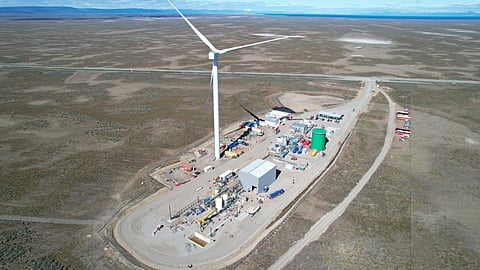The World’s First Industrial-scale Facility for Carbon-neutral Fuel
Production at the world’s first fully integrated facility for making carbon-neutral, synthetic fuels commenced on Tuesday (December 20).
The Haru Oni plant, near the city of Punta Arenas in southern Chile, combines wind power, water, and CO2 to make e-methanol and ultimately electricity-based carbon-neutral gasoline.
Siemens Energy designed and led the system integration of HIF Global’s pilot plant in collaboration with Porsche and other partners.
The start of production of the first eFuels is a key step forward in decarbonizing the transportation sector, especially those segments that are difficult or impossible to electrify, like marine and aviation, or internal combustion engine cars that are still in use.
MOCCAE Launches Roadmap for National Carbon Sequestration Project
Siemens Energy Managing Board Member Anne-Laure de Chammard stated: "The Haru Oni project aims to demonstrate that eFuels can be brought to market in large quantities and at competitive prices.
"It lays the foundation for bringing green energy to areas that are still heavily dependent on fossil fuels.
"This is key to achieving the climate goals of the transportation sector. The knowledge gained from this project will also help develop climate-friendly solutions for many other applications.”
By March 2023, the plant will be completed in less than two years in Magallanes province in Chile’s southern Patagonia region. As the co-developer and systems integrator, Siemens Energy has played a major role in designing this lighthouse project.
Hydrogen, the basis of the fuel synthesis process, is produced in an electrolyzer from Siemens Energy. The wind turbine came from Siemens Gamesa.
The project’s big challenge was to combine process steps for making synthetic fuels that had previously only been tested individually, and to coordinate them in a production chain for the first time in an efficient and trouble-free way. That integration is the basis for the ramp-up for eFuel production.
The system is expected to produce 130,000 liters of eFuel per year by 2023. After the pilot phase, the first scaling will take the project in Chile up to a projected 55 million liters per year by the middle of the decade. Around two years later the capacity is expected to be 550 million liters per year.
The project is tapping Patagonia’s vast potential of renewable energy to assist the hydrogen economy, and thus the energy transition in Europe and around the world.
The windy region offers as much as 6,000 full-load hours of operation for generating green electricity, around three times the amount available in Europe. Wind power is stored in liquid energy carriers using the power-to-X process.
Those liquids are easy to transport out of a region with lots of renewable energy to places that are hungry for energy. Haru Oni is doing pioneering work here and may serve as a role model for many other regions around the world.
It enjoys support from Germany’s Federal Ministry for Economic Affairs and Climate Action: in 2020, Haru Oni became the first hydrogen project to be funded as part of Germany’s national hydrogen strategy.
The project is the first to apply the Clean Energy Certification solution developed by the TÜV Süd testing NGO and the German Energy Agency (DENA) in collaboration with Siemens Energy.
That digital certificate provides fake-proof documentation that a product has earned the right to be called “green.”
For a product to receive the certificate, the carbon footprint is documented for the first time across the entire production chain – in the case of eFuels, that means from the wind turbine to filling the tank.
The certified e-gasoline from the Chilean plant will meet the EU’s requirements for sustainable fuels.
Read More: Abdul Latif Jameel Energy’s FRV Acquires Majority Stake in Major BESS


